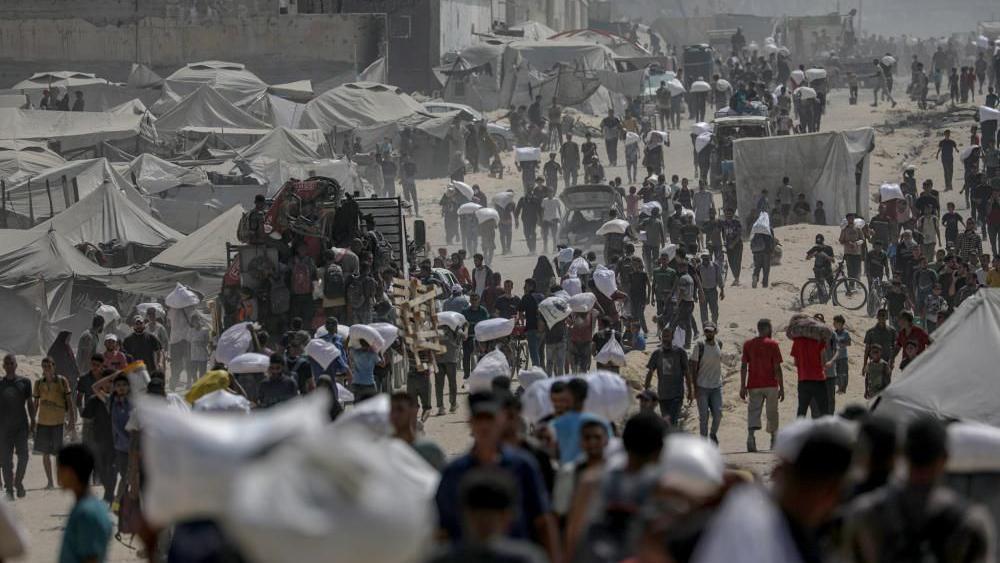
Rising Death Toll and Escalating Crisis in Gaza
Recent reports indicate a further 11 deaths due to malnutrition in Gaza, according to the Hamas-run health ministry. This brings the total number of malnutrition-related deaths to 212, with 98 of them being children. In addition, at least 38 people have been killed and 491 injured as a result of Israeli military activity over the past 24 hours.
The situation continues to deteriorate as residents are given a deadline of 7 October 2025 to evacuate Gaza City. This follows the announcement of a controversial Israeli plan to take control of the area. The plan, approved by the Israeli security cabinet, outlines five "principles" for ending the war in Gaza, one of which is "taking security control of the territory." According to Israeli media, the plan initially focuses on taking full control of Gaza City and relocating its estimated one million residents further south.
This move has drawn criticism from world leaders and opposition within Israel, including military officials and families of hostages still held in Gaza who fear for their safety. Israel has rejected these criticisms, with Defence Minister Israel Katz stating that condemnation would "not weaken our resolve." Meanwhile, the U.S. has taken a more lenient stance, with former President Donald Trump suggesting it was "pretty much up to Israel" whether to fully occupy the Gaza Strip.
The Impact of the New Plan
Israeli media reports suggest that the government has set a two-month deadline before a military siege of Gaza City begins on 7 October 2025, marking the two-year anniversary of the war's start. Within this timeframe, Israel plans to forcibly displace the estimated one million Palestinians living in Gaza City, roughly half the population of the entire territory.
Gaza City, the capital of the Gaza Strip, had a pre-war population of around 600,000, but this number has grown significantly due to the Israeli military campaign pushing Palestinians into the city. Many now live in tents or ruins of buildings damaged by air strikes. The plan involves moving the population towards al-Mawasi, a large tent encampment in the south of Gaza, already home to thousands of displaced Palestinians suffering from poor facilities and sanitation.
Humanitarian agencies and many of Israel’s allies have widely condemned the plan, citing its potential to cause immense human suffering. The move will further complicate Palestinians’ ability to meet basic survival needs, especially as famine is already prevalent in the region. A UN-backed global food security expert recently stated that the "worst-case scenario of famine is currently playing out."
Aid Challenges and Ongoing Violence
The UN's humanitarian agency reported that the amount of aid entering Gaza continues to be far below the minimum required to meet people's needs. Israel denies there is starvation in Gaza, accusing UN agencies of not picking up aid at the borders and delivering it. The agency also noted ongoing impediments and delays in collecting aid from Israeli-controlled border zones.
Challenges in distributing aid persist, with deaths of people trying to get food continuing to be reported. The Gaza health ministry said 21 people were killed trying to get aid in the last 24 hours. The UN reported earlier this month that 1,373 Palestinians have been killed seeking food since late May, when a new US and Israeli-backed organization, the Gaza Humanitarian Foundation (GHF), set up aid distribution sites.
The GHF denies the UN's figures, while Israel accuses Hamas of instigating chaos near aid centers and claims its forces do not intentionally open fire on civilians. However, the lack of independent reporting from Gaza makes verification difficult.
Potential Consequences and Humanitarian Concerns
In announcing the plan to conquer Gaza City, Israel's prime minister's office stated it will provide "humanitarian aid to the civilian population outside the combat zones," though no further details were provided. Like previous forced displacements, the expulsion of Palestinians is likely to involve chaotic and dangerous scenes of families traveling by foot, cart, or overloaded vehicles.
After the 7 October 2025 deadline, Israel's military is expected to lay siege to Gaza City and escalate attacks. Hamas has vowed to resist Israel's attempt to conquer the city. If Hamas fighters hold Israeli hostages in Gaza City, this period could prove the most deadly, as Hamas has ordered captors to kill hostages if Israeli troops approach.
An estimated 20 Israeli hostages remain alive in Gaza, some believed to be held around Gaza City. Israel launched its military offensive in Gaza after the Hamas-led attacks on 7 October 2023, which resulted in about 1,200 deaths and 251 hostages taken. Since then, more than 61,300 people have been killed in Gaza due to Israeli military operations.
